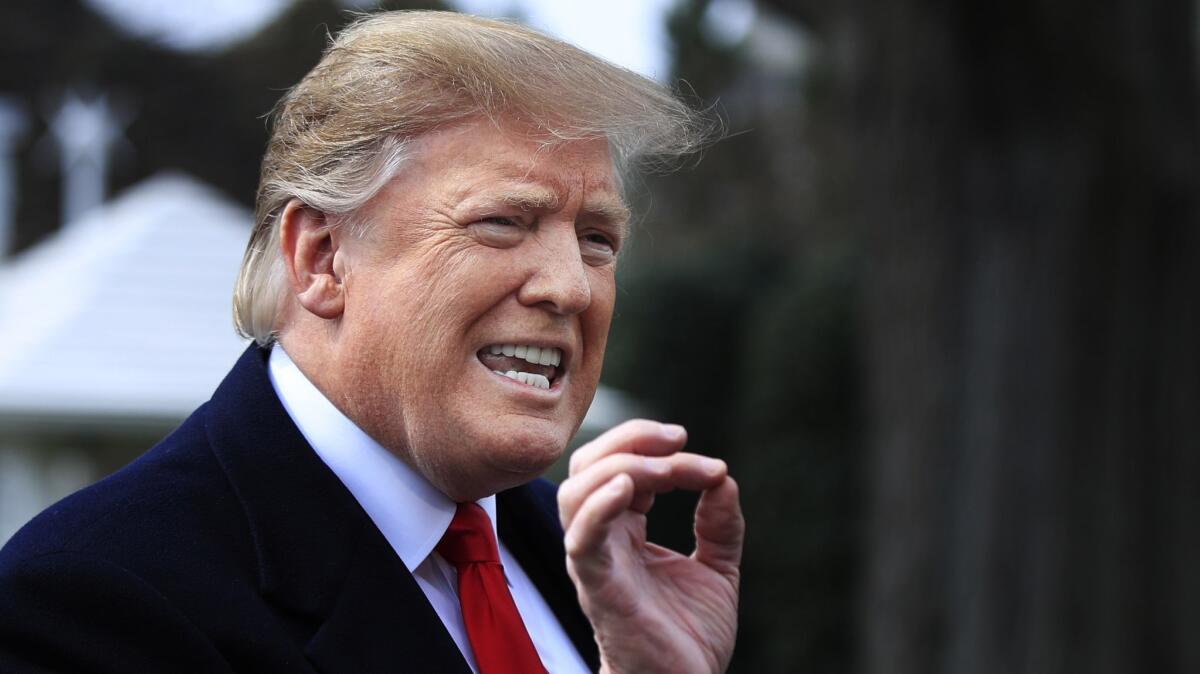Editorial: Trump is politicizing (and personalizing) the pardon process

A president’s power under the Constitution to “grant reprieves and pardons for offenses against the United States” can be an important safety valve when the criminal justice system fails or when an offender has served his time and turned his life around. But the pardon power must be exercised for good reasons and free of political favoritism, or else its legitimacy is degraded.
Donald Trump doesn’t seem to understand that. For him, the quality of presidential mercy often seems to depend on whether the offender is an admirer. Or a political supporter. Or the beneficiary of lobbying by celebrities or coverage on his favorite news channel. It’s as if he were still starring on a reality TV show that ended every week with a climactic “You’re pardoned!”
On Wednesday Trump issued two pardons: one for former newspaper proprietor Conrad Black, who served 37 months in federal prison for fraud and obstruction of justice, the other for Pat Nolan, a former Republican state legislative leader in California who spent years in prison after pleading guilty in the “Shrimpscam” FBI sting in the 1990s. (Nolan maintained his innocence and said he pleaded guilty to avoid a sentence that could have kept him away from his family longer.)
The fact that the president can exercise his pardon power capriciously doesn’t make it right.
Even if one thinks Nolan’s pardon is justified by his good works on criminal justice reform after his release, it’s also true that he was a prominent official in the president’s party. The Black pardon has the additional — and familiar — element of extending clemency to people who are personally connected to or politically in sync with the president. Black, a longtime associate of the president, is the author of a biography with the Trumpian title “Donald J. Trump: A President like No Other.”
The Black pardon follows pardons for Arizona’s Sheriff Joe Arpaio, a vocal Trump supporter who was absolved of a contempt-of-court conviction, and conservative provocateur Dinesh D’Souza, who pleaded guilty to a campaign-finance violation. In pardoning D’Souza, Trump essentially endorsed the commentator’s claim that he was the victim of a “vindictive political hit” by the Obama Justice Department. D’Souza then released a film that likened Trump to Abraham Lincoln.
The Black pardon also reflects another feature of Trump’s approach to clemency: the value the president attaches to celebrity. White House Press Secretary Sarah Huckabee Sanders emphasized that Black’s case “has attracted broad support from many high-profile individuals who have vigorously vouched for his exceptional character,” including Henry Kissinger and Elton John. Celebrity has played a problematic role even in clemency decisions that seem just, such as Trump’s decision to commute the life sentence of Alice Marie Johnson, a nonviolent drug offender whose case was brought to the president’s attention by Kim Kardashian West.
The pardon power is admittedly broad. For example, the president isn’t required to wait for a pardon application to work its way through the bureaucracy of the Justice Department’s pardon attorney. Nor is the power limited to blotting out the convictions of deserving individuals. With Watergate on his mind, Gerald Ford preemptively pardoned Richard Nixon for any crimes he may have committed while president, and Jimmy Carter issued a pardon for American men who had evaded the draft during the Vietnam War. And Congress may not interfere with pardons.
Enter the Fray: First takes on the news of the minute »
Still, the fact that the president can exercise his pardon power capriciously doesn’t make it right. Trump needs to resist the temptation to use the pardon power to reward allies and score political points. And his administration, which has embraced criminal justice reform, should harness the pardon power to redress injustices that affect large numbers of people. That’s what the Obama administration did in 2014 when it established a Clemency Initiative, which encouraged federal inmates to petition the president for a reduced sentence.
And while Congress may not interfere with or overrule pardons, it can play a role in investigating whether they were the result of a corrupt process. Congress held hearings after Ford preemptively absolved Nixon and after Bill Clinton disgracefully pardoned fugitive financier Marc Rich, whose former wife had made large contributions to the Democratic Party and Bill Clinton’s presidential library. Congress can also impeach a president who has exercised his pardon power for corrupt purposes — say, by dangling a pardon to reward a witness for remaining silent.
But only the president can decide to exercise his pardon power in an evenhanded and principled way. Trump needs to do better.
Follow the Opinion section on Twitter @latimesopinionand Facebook
More to Read
A cure for the common opinion
Get thought-provoking perspectives with our weekly newsletter.
You may occasionally receive promotional content from the Los Angeles Times.










